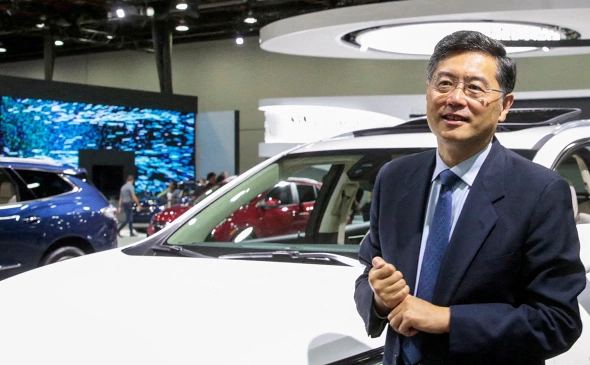China’s Ambassador to the U.S. Qin Gang is China’s new foreign minister
For the first time in nine years China has a new foreign minister. The new minister is considered a close aide to Xi Jinping and a supporter of a hawkish policy, but before his appointment he called for peaceful coexistence between the US and the PRC
China’s new foreign minister is Qin Gang, China’s ambassador to the United States, reports the Chinese TV channel CGTN. He succeeds Wang Yi, who has led the agency since 2013 and has been a member of China’s State Council since 2018.
Qin Gang has been China’s ambassador to the United States since July 2021. Prior to that, he was China’s deputy foreign minister, spokesman for the Chinese Foreign Ministry (head of the information department), and Chinese ambassador to the United Kingdom.
Reuters and Singapore’s The Straits Times describe him as a “trusted aide” to Chinese leader Xi Jinping. “He was promoted because, like others, he is very loyal to Xi Jinping. But he hasn’t gotten very far in relations with the U.S.,” Hong Kong-based SCMP quoted Jeffrey Moon, president of China Moon Strategies and former U.S. consul general in Chengdu, as saying. As the newspaper notes, Qin Gang arrived in Washington during a period of very uneasy relations between the PRC and the United States and during his time as head of the embassy he drew attention with a number of tough statements. He has earned a reputation as a “battle wolf,” says Bonnie Lin, a senior fellow at the Center for Strategic and International Studies and former director of China affairs at the U.S. Defense Department. The term “battle wolf” in Chinese terminology refers to supporters of radical politics, or “hawks,” as such politicians are commonly called in the West.
But some analysts interviewed by SCMP said that Qin Gang`s behavior as ambassador to the US “was not as aggressive as many feared. Foreign Policy also noted at the time of his appointment as ambassador to Washington that he did not live up to his reputation as a hardline nationalist. For example, shortly after his arrival in Washington, he publicly offered the U.S. cooperation in developing vaccines against COVID-19.
“Those of us in the press corps [in Beijing] who have known Qin for years have seen him as a slick, cunning player who is not necessarily anti-American (he was a news assistant at United Press International, an American news agency, before joining the Foreign Ministry in 1992), but who knows exactly how to keep his nose in the wind depending on Beijing policy,” Newsweek Beijing Bureau Chief Melinda Liu describes him.
Two days before his appointment as China’s foreign minister, Qin Gang published a policy article in the American edition of The National Interest entitled “How China sees the world. In it, he said that the Chinese and Americans should seek a way to get along “on the basis of mutual respect, peaceful coexistence and mutually beneficial cooperation.” “Seeing the world as a community with a shared future naturally leads to reform, openness and mutually beneficial cooperation,” Qin Gang wrote.
